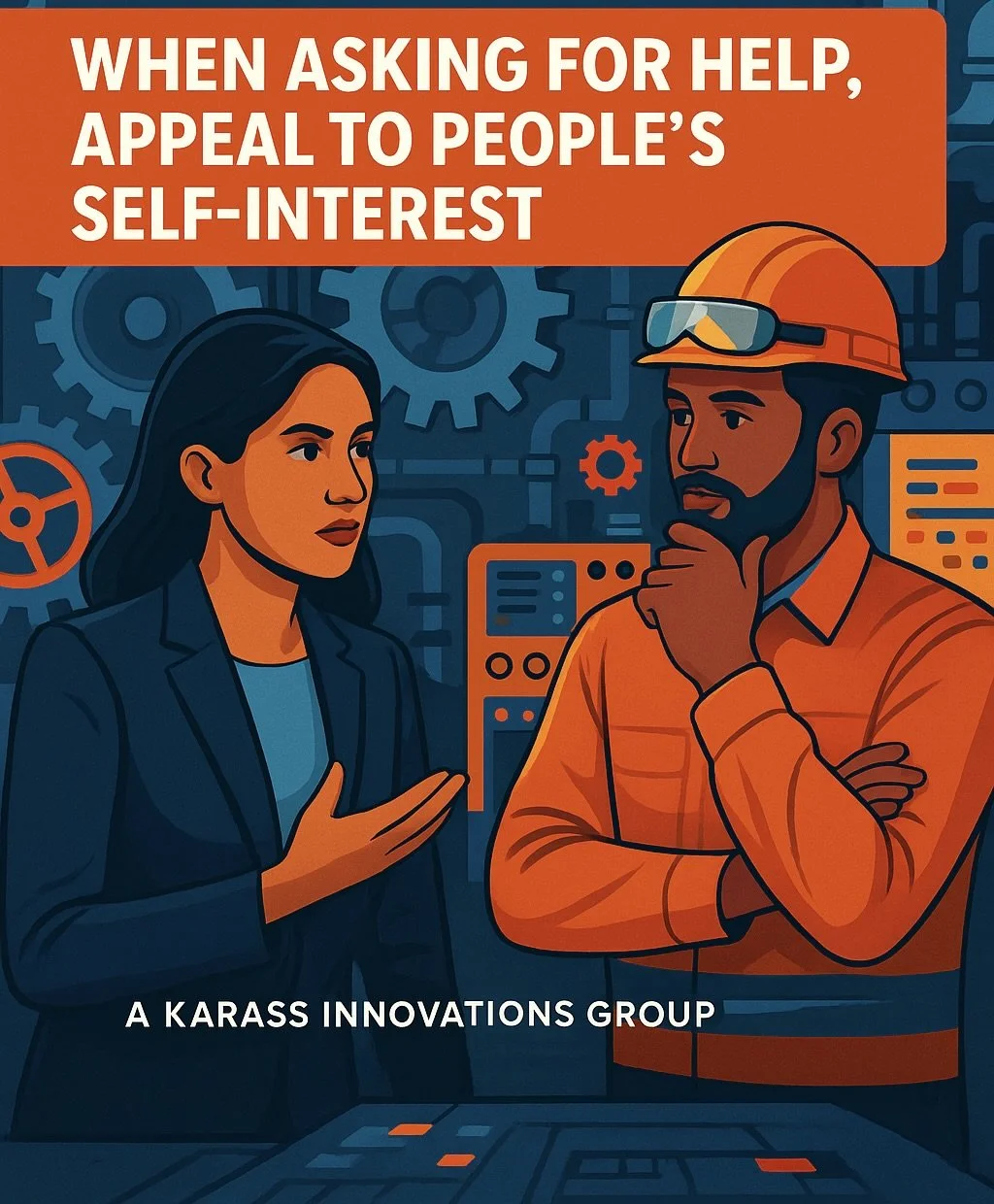People are motivated by their own needs and desires. When you ask for help, frame your request in a way that benefits the other party. Show them how assisting you aligns with their own goals, and they will be far more likely to lend their support.
Industry Trends and Leadership Insights: “When Asking for Help, Appeal to People’s Self-Interest”
Manufacturing & Operations
In manufacturing, appealing to self-interest is a critical leadership lever for driving lean initiatives and cross-functional collaboration. Rather than mandating compliance with process improvements, modern plant leaders tie participation to individual or departmental benefits like reduced downtime or higher incentive pay. According to a 2023 Lean Enterprise Institute report, plants that tied improvement projects to operator incentives saw a 28% higher engagement rate compared to those that relied solely on top-down directives. When team members understand how initiatives help them hit performance targets or reduce overtime, cooperation becomes intrinsic.Economics & Business Strategy
Economically, self-interest is a cornerstone of rational choice theory and behavioral economics. In business, this translates into stakeholder capitalism, where companies must appeal to investors, employees, and customers by aligning initiatives with their individual gains. The World Economic Forum reports that 72% of executives now prioritize framing business transformations in terms of stakeholder value—like career development or profitability—rather than organizational compliance. This approach doesn’t just boost participation; it also de-risks change fatigue.Engineering & Innovation Culture
In engineering environments, leaders are increasingly using self-interest framing to drive innovation. Engineers are often motivated by solving complex problems and earning recognition. When management appeals to these motivations—such as offering intellectual ownership of process improvements or visibility for patent applications—engagement rises. A study by Deloitte in 2022 found that engineering teams offered creative autonomy were 42% more likely to exceed project goals. The lesson: innovation thrives when it’s personally rewarding.Scientific Research & Academia
In science and education, collaboration often hinges on recognition, funding, or publication. When leaders or project leads appeal to these career incentives—such as co-authorship, grant eligibility, or speaking opportunities—they gain traction faster. The NIH reported in 2021 that research consortia with shared credit models produced 33% more cross-disciplinary publications. Academics are more willing to collaborate when their individual aspirations for tenure or citations are explicitly acknowledged.Medical & Healthcare Systems
Healthcare is increasingly team-based, but nurses, physicians, and admin staff have diverse priorities. Appealing to self-interest—such as reducing patient wait times to improve satisfaction scores tied to performance bonuses—creates alignment. The Cleveland Clinic implemented a self-interest-based scheduling system for care teams and saw patient throughput increase by 19% and provider satisfaction rise by 14%. Understanding and aligning to each stakeholder's priorities is becoming a core part of value-based care delivery models.Marketing & Customer Engagement
Marketing teams use this law intuitively—by framing calls to action around the customer’s self-interest. In B2B marketing, campaigns that highlight how a product helps increase ROI or job performance convert at higher rates. A 2024 HubSpot report noted that conversion rates increased by 35% when pitches were aligned with customer KPIs, such as “boost revenue” or “reduce churn.” In internal marketing (change management), the same principle applies: show internal teams how a new CRM or system will save them time, not just benefit the company.Services, Warehousing & Supply Chain
In logistics and supply chain, appealing to frontline workers’ self-interest can improve system adherence. For example, warehouse operators are more willing to follow inventory protocols if shown how these reduce double-handling or workload stress. UPS implemented a performance bonus system tied to team-level accuracy and saw scanning compliance rise by 31%. Self-interest appeals—especially around time, safety, and financial rewards—drive cultural alignment faster than rule enforcement.
• 8. Leadership & Organizational Culture
Across all sectors, the shift toward servant and transformational leadership includes a core tenet: understanding what motivates your people. When leaders consistently frame initiatives in terms of team members' self-interest—career growth, job security, recognition, or autonomy—they build trust and engagement. Gallup’s 2023 “State of the Global Workplace” found that 74% of highly engaged employees reported their manager "understands what motivates me at work.” Appealing to self-interest is not manipulation—it’s an essential leadership skill in today’s value-driven, multi-stakeholder environments.

